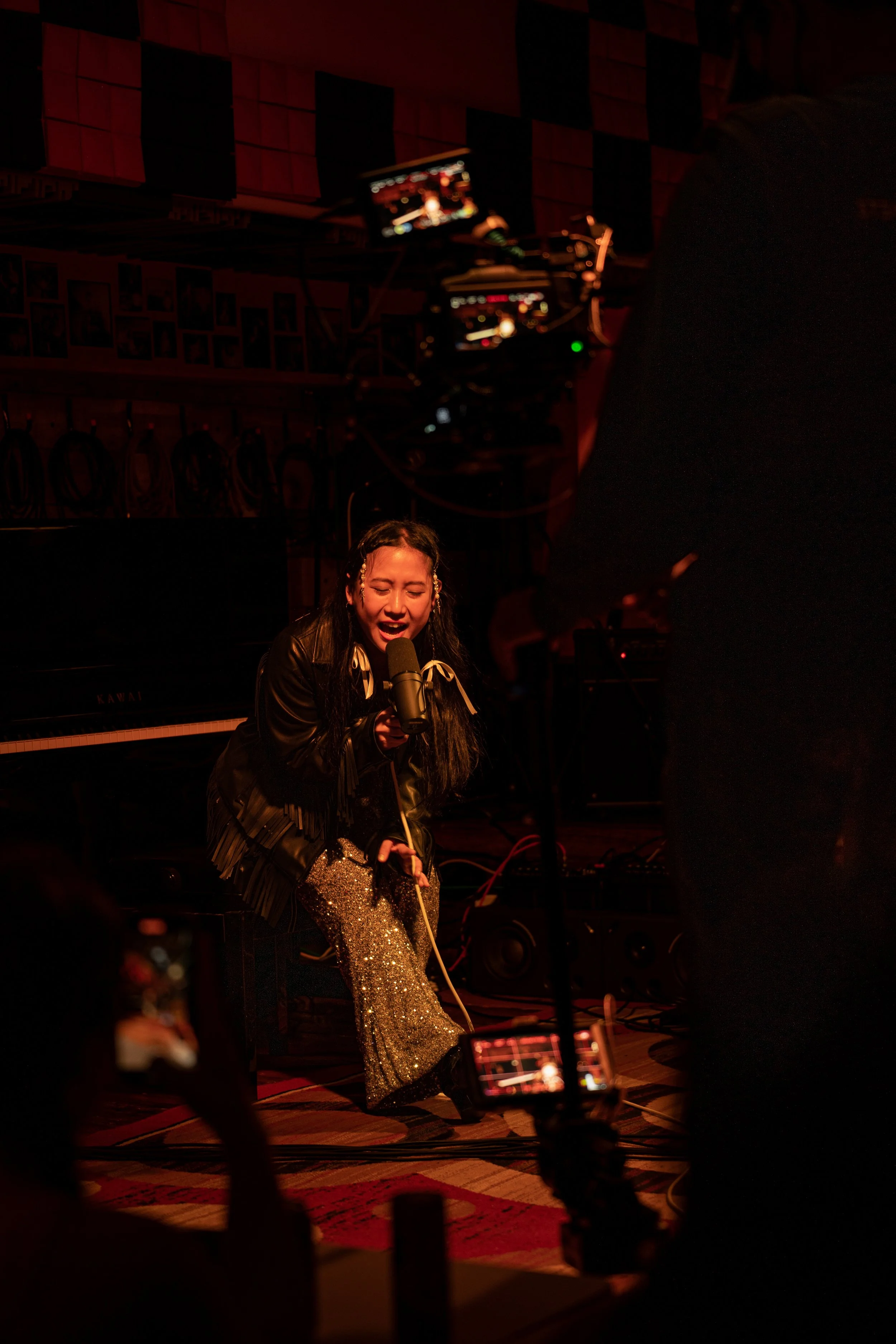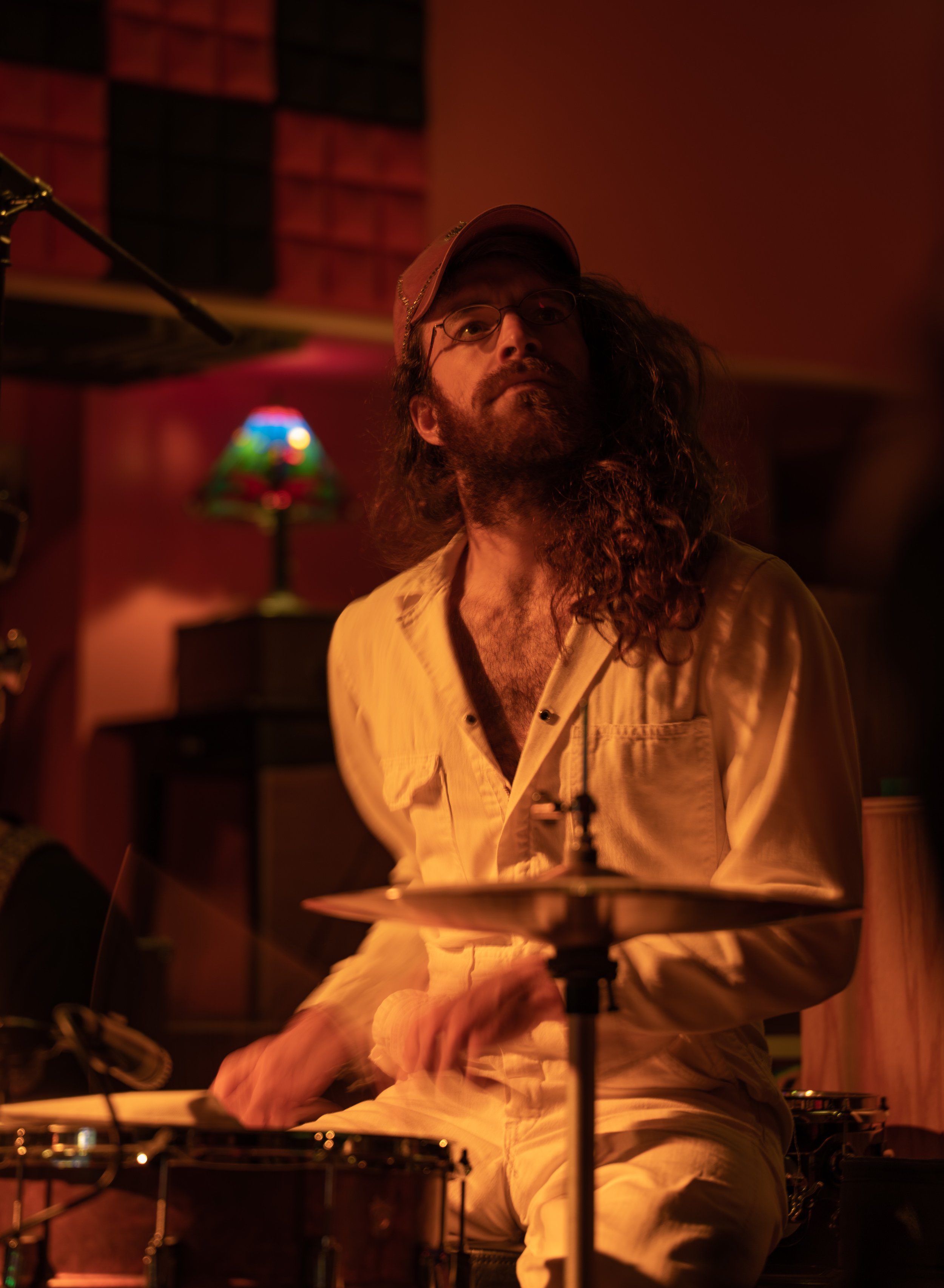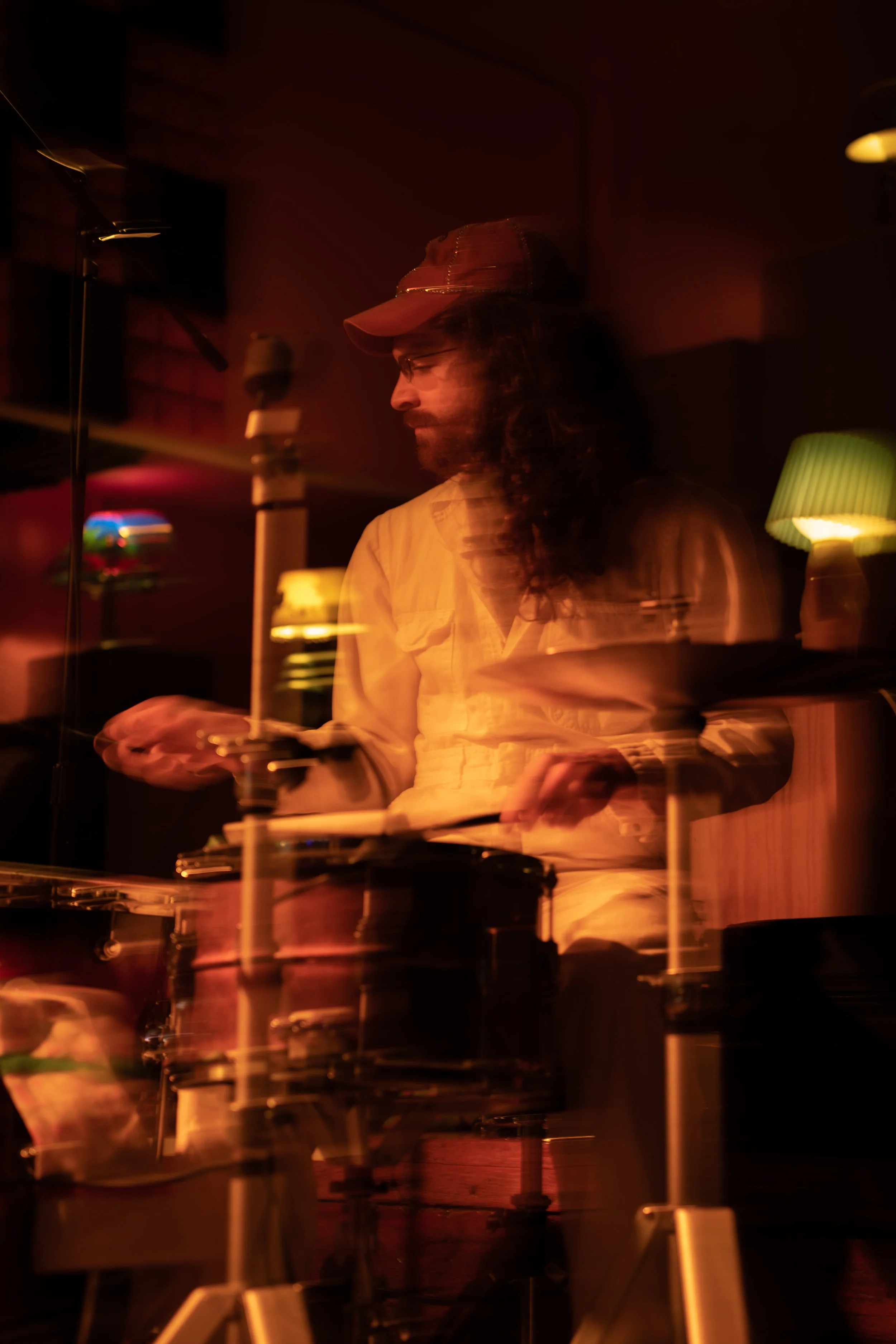ÊMIA Embraces Asian Collaboration in a Sea of NYC Chaos
by Isabel Lai
With a vision of Asian American empowerment and creative collaboration, the rising indie pop singer, ÊMIA, real name Anh Le, has embarked on a remarkable endeavor to bring her recent single with fellow artist Marian Carmel, “my stupid feelings,” and her unreleased single, “dumb luck,” to life. On May 8, ÊMIA invited Rice & Spice to the taping of her live performance video of the two songs at pinkFROG cafe in Williamsburg. In this exclusive BTS interview and in honor of AANHPI month, Rice & Spice highlights members of the video's creative team, including ÊMIA, pinkFROG cafe owners Peter Chen and Lan Lin, videographer Alan Tan, and stylist Jessica Zheng, who shared their experiences as Asian creatives in their respective fields. Together, they are forging a path of inclusivity to bring awareness and support to the rise of Asian talent in America.
ÊMIA (Musician)
Post-interview and performance additional thoughts by ÊMIA regarding the production of the two songs:
I made “my stupid feelings” with my friend Charlie Kurata, a Paris-based, Japanese-French producer, and Marian Carmel, a Singapore-based, Filipino singer-songwriter. “dumb luck” was written by me and Charlie and produced by Charlie. I am so lucky that the Internet has enabled me to not only work with people I probably would've never run into otherwise, but it has allowed me to create deep friendships with people across the world. There is so much freedom and safety and working with people I trust. That's how I felt working with Charlie and Marian. Marian has also lived through the chaos that inspired “my stupid feelings” and Charlie has heard about my unhinged episodes for years now. These two songs are all part of my upcoming EP, “VIDEO CALL: PM” which is the sequel to, “VIDEO CALL: AM,” an EP that I released last September. This project was inspired by the conversations that Charlie and I had over Facetime and iMessage prior to meeting each other for the first time last year in Paris. I've always wanted the project to feel like a conversation at a sleepover, a tell-all gossiping sesh at brunch with your best friends. I hope that's what people get when they listen to the final product.
What was the inspiration behind “my stupid feelings”?
For the two years that Charlie and I were writing these songs for my EP, I was constantly in the state of like, “Shit, why am I always single?” and “When am I ever gonna find everlasting love?” There's layers to it. I think the feelings of wanting to belong somewhere or wanting to matter to someone— they are all reminiscences of feeling different but wanting to turn feeling different into feeling special. In a chaotic way, it's me just exploring the side of feeling resentful of myself for being dramatic about love and having too many feelings, but also always wishing for that fairytale ending and so making fun of myself for that. But also, giving myself space to just simply feel the stupid feeling.
Any recent milestones? What's next for you?
I’ve always taken huge pride in my music journey because I currently don't have management or a label. And so, most recently one of my fully independent singles “TwentyFour” made it onto Starbucks' official playlists, and it’s playing everywhere now. These couple of things make it feel like things are moving forward, even when it doesn't feel that way all the time. Yeah, and honestly a big big goal— I would love to have a song in a rom-com. I’m dying for some Netflix show featuring Noah Centineo or Lana Condor, come on. I want my song to be played during a breakup scene. And yeah, I'd love to eventually go on tour. But one cafe at a time.
How has the Asian American platform helped push your music career personally?
I think because a lot of us grew up first or second-generation, the expectation is to be very practical. So there's just this understanding and pain that I think many of us have experienced as Asian creatives— where your families were likely not supportive of you pursuing something that is very risky in their eyes. You feel like the support is so strong because you just feel the empathy from someone also trying to make their dreams come true.
Any advice for any Asian American trying to break into the music industry?
You have to post. Don't keep anything to yourself and be embarrassing. I feel like any creative that I'm currently envious of I'm like, “Damn, they really do shit I want to do.” They give zero fucks. Yeah, even though it’s so against “the Asian way,” putting yourself out there and demanding to take up space is the biggest advice I’d have to give.
Anything else you'd like to like, say as a final like message to the world or anyone reading this article?
For a really long time, I was told “Oh, you need to get this many followers in order to drop an album” or “You have to have this much money to make a music video.” And that's kind of the same advice that I got for this video project. I think if there's always a way to make something happen, I don't really believe in waiting until you're “ready.” People should just do whatever the hell they want. Just do it. That's super cheesy, but I mean it.
Peter Chen and Lan Lin (pinkFROG Cafe Owners)
Nestled in the heart of Williamsburg, the vibrant and eclectic pinkFROG Cafe created by Peter Chen and Lan Lin is quickly becoming a melting pot of cultures and artistic expression. Combining Peter’s love for music and sculpting and Lan’s background in design, their cafe is a testament to their shared creativity and desire to provide a stage for diverse talents and a hub for cultural exchange.
Can you tell me more about your background? Where did you grow up, and how did it influence the design of your cafe?
Peter: I grew up in Taiwan, and then in Argentina, and then moved here to NYC, so I have three cultures all combined within me. The world’s mixed now— there are all kinds of influences with each other, so we like to have a lot of different cultures in our cafe. Like our menu, we have Taiwanese Lu Ruo Fan, Beijing Zha Jiang Mian. We also have Korean Gochujang teriyaki chicken, Thai tea, and Japanese sake. We have a lot of fusion. With the designs in our cafe, I like being inspired by different cultures’ art and music. I liked classical music at first, but then I dabbled with rock music and then jazz. And that’s why we created the stage— we are trying to open this cultural stage. We want to see people from all over the world.
How has it been starting a cafe as an Asian entrepreneur? Has there been a lot of challenges?
Lan: It's not easy because we’re all artists, musicians, and designers here. We put all our savings into starting this cafe. We sold our apartment, you know, so it's a gamble. But, in the end, we’ll be okay. The most difficult part is spreading the word and letting people know that we exist because nobody knew us at the beginning. Especially for me, I'm not trained in social media. So, word of mouth is very slow. Compared to that, it’s not especially hard, it just takes a lot of effort and work.
Do you have any advice for future Asian business owners on opening a cafe or restaurant?
Peter: I would advise people who want to open a cafe, or any kind of store, to just follow your passion. You know, it's hard. It's gonna be hard, but if you have the passion, you can do it.
Lan: Yeah! Everything we’re doing in this cafe is actually serving the stage - it’s all in order to have the stage and dream survive. We're not a regular coffee shop. We just want good things to happen here - to gather people so all kinds of cultures can happen here. That was the main goal. Making money definitely is not the first purpose. Otherwise, it's not meaningful to us. I'm sure a lot of people will say that it’s not realistic, but we're doing something because it's a dream. Hopefully, we or anyone can make it with no regrets.
pinkFROG owners Peter Chen and Lan Lin
Alan (Videographer)
Alan Tan is a freelance videographer and photographer based in NYC. Having honed his skills for over a decade, Alan’s success is fueled by the power of passion, perseverance, and meaningful connections. From dance videos to Adidas campaigns, and weddings to Coach and Harper’s Bazaar editorials, he continues to inspire and support other young Asian creatives seeking to make their mark in the industry.
What's the process like being a videographer, and how did you meet Ahn?
Being a freelance videographer, I would say it's fun. I'm happy to be doing something I love and being able to survive in NYC doing it. In terms of working with Ahn and Mateo, they already cooked something up in terms of creativity. I've worked with Ahn in the past. She was looking for a videographer on Asian Creative Network, and I reached out and recorded a show for her. She remembered me and brought me onto this shoot.
Have you faced any challenges or obstacles as an Asian freelancer, videographer, or creative?
There are pros and cons. In terms of me growing up, I didn’t have a father who was well-networked because he came from a different country. So, I would say it felt more difficult because other creatives seemed to know more people in the industry. However, Asians tend to hire each other to support each other. So, there's a positive in that. Like, I didn't realize how powerful ACN was. I met a lot of people and got a lot of jobs from that platform. Even generally, some companies like to hire videographers that can speak other languages or even for other gigs like Korean or Chinese weddings - they like to hire someone who understands the culture.
Any advice to any young freelancers or creatives trying to break into the industry that you're in?
I'd say try to meet people. I am only where I am now because of the people that I know from these opportunities. If I was trying to do everything by myself, I don't think I’d be where I am. I'm a very introverted person. So be friendly and just be polite. Be great to work with. You know, being personable really goes a long way in terms of getting jobs. Yeah, and showcase your work. Showcase your art— whatever art form that may be.
Any message you want to share with the world through Rice & Spice?
Try to find art within your culture and in your childhood experiences as well. Use your background to your advantage. Let it inspire you to create art and spread awareness. It's a multicultural world, right? Not everyone's gonna know about Asian culture. I think they're interesting parts of that, but also, don’t be afraid to learn and dive into other cultures as well.
Jessica Zheng (Stylist)
Jessica Zheng is a budding fashion stylist with a passion for storytelling through costumes. Although she initially stumbled into the fashion industry by accident, her journey has been filled with exciting opportunities such as volunteering for New York Fashion Week or being featured in New York Magazine. As a Chinese-Indonesian, Jessica has experienced a rediscovery of her Chinese culture and embraces her heritage through her own collection of vintage clothing. She is known as the “Qipao girl.”
What was the inspiration behind Ahn’s look?
Most of the work is her honestly. I'm just there to nudge a little. I always ask, “What are you trying to feel at the moment? What are you trying to show?” Because I feel your mood is really important to how you dress and people don't acknowledge that enough. Ahn said she wanted something really carefree, spontaneous, and also kind of messy. At first, I thought fringes— it has a lot of movement and it captures the idea of being playful and messy, but messy in a very spontaneous way rather than out of control. Then, finally glitter just because it looks beautiful when you move around.
How do you infuse your cultural identity into your style whether it's through your own look or costumes?
I kind of have this rediscovery of my Chinese culture specifically because I was kind of robbed of that part of growing up in Indonesia. We went through a period where there were a lot of discriminatory laws under dictatorship. So, I love collecting vintage traditional clothing— like qipaos. I love to represent my culture whether it's through fashion or costumes.
In honor of AAPI Heritage Month, what does it mean to you to celebrate and uplift the Asian community through your work?
Me and my friend always make an excuse to dress in qipaos, and there was this lady that went up to us and was like, “Oh my gosh, you guys dress up like how I used to back in Hong Kong in the 60s.” Oh my god, that was the best compliment I've ever heard. I was so happy. I feel so honored. There's so much love in the Asian community [that] I feel we don't really highlight that enough.
Do you have any advice or message you'd like to share with other young Asian artists wanting to break into the creative industry?
I think when it comes to the Asian community we tend not to be “out there” - we tend to be more subtle. And I want to see that change in that way. I like the word shameless— I feel like we need to be a little more shameless. That’s why I love celebrating the Lunar New Year. I love how extra it is. I love how loud it is. I want that spirit to be kept alive for the entire year— not just for May. I love how proud of ourselves or our identity.
Drummer Wyatt Bertz
Guests at the performance






















